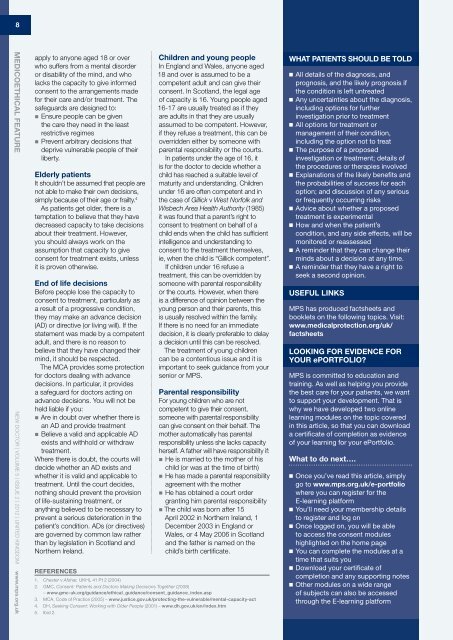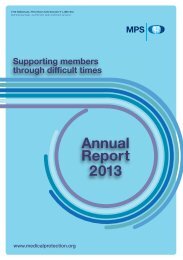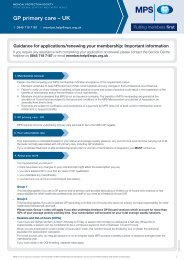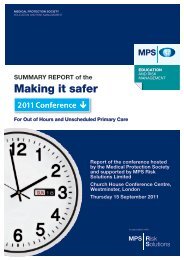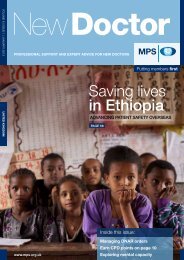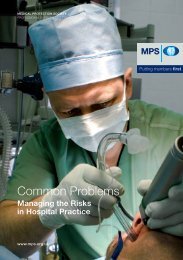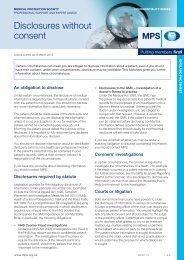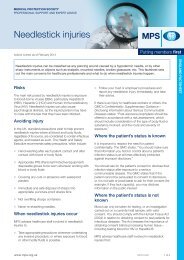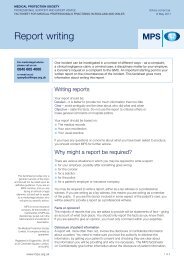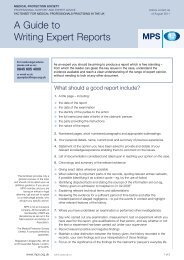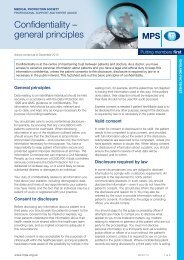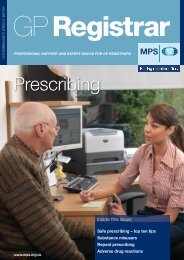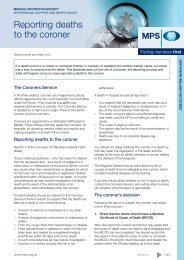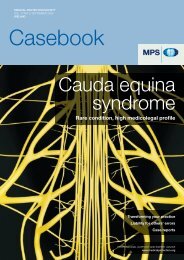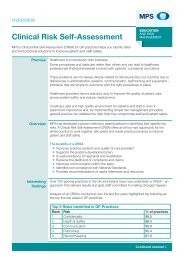New Doctor - Medical Protection Society
New Doctor - Medical Protection Society
New Doctor - Medical Protection Society
Create successful ePaper yourself
Turn your PDF publications into a flip-book with our unique Google optimized e-Paper software.
8<br />
MEDICOETHICAL FEATURE<br />
NEW DOCTOR | VOLUME 5 | ISSUE 2 | 2012 | UNITED KINGDOM www.mps.org.uk<br />
apply to anyone aged 18 or over<br />
who suffers from a mental disorder<br />
or disability of the mind, and who<br />
lacks the capacity to give informed<br />
consent to the arrangements made<br />
for their care and/or treatment. The<br />
safeguards are designed to:<br />
■ ■ Ensure people can be given<br />
the care they need in the least<br />
restrictive regimes<br />
■ ■ Prevent arbitrary decisions that<br />
deprive vulnerable people of their<br />
liberty.<br />
Elderly patients<br />
It shouldn’t be assumed that people are<br />
not able to make their own decisions,<br />
simply because of their age or frailty. 4<br />
As patients get older, there is a<br />
temptation to believe that they have<br />
decreased capacity to take decisions<br />
about their treatment. However,<br />
you should always work on the<br />
assumption that capacity to give<br />
consent for treatment exists, unless<br />
it is proven otherwise.<br />
End of life decisions<br />
Before people lose the capacity to<br />
consent to treatment, particularly as<br />
a result of a progressive condition,<br />
they may make an advance decision<br />
(AD) or directive (or living will). If the<br />
statement was made by a competent<br />
adult, and there is no reason to<br />
believe that they have changed their<br />
mind, it should be respected.<br />
The MCA provides some protection<br />
for doctors dealing with advance<br />
decisions. In particular, it provides<br />
a safeguard for doctors acting on<br />
advance decisions. You will not be<br />
held liable if you:<br />
■ ■Are<br />
in doubt over whether there is<br />
an AD and provide treatment<br />
■ ■ Believe a valid and applicable AD<br />
exists and withhold or withdraw<br />
treatment.<br />
Where there is doubt, the courts will<br />
decide whether an AD exists and<br />
whether it is valid and applicable to<br />
treatment. Until the court decides,<br />
nothing should prevent the provision<br />
of life-sustaining treatment, or<br />
anything believed to be necessary to<br />
prevent a serious deterioration in the<br />
patient’s condition. ADs (or directives)<br />
are governed by common law rather<br />
than by legislation in Scotland and<br />
Northern Ireland.<br />
REFERENCES<br />
Children and young people<br />
In England and Wales, anyone aged<br />
18 and over is assumed to be a<br />
competent adult and can give their<br />
consent. In Scotland, the legal age<br />
of capacity is 16. Young people aged<br />
16-17 are usually treated as if they<br />
are adults in that they are usually<br />
assumed to be competent. However,<br />
if they refuse a treatment, this can be<br />
overridden either by someone with<br />
parental responsibility or the courts.<br />
In patients under the age of 16, it<br />
is for the doctor to decide whether a<br />
child has reached a suitable level of<br />
maturity and understanding. Children<br />
under 16 are often competent and in<br />
the case of Gillick v West Norfolk and<br />
Wisbech Area Health Authority (1985)<br />
it was found that a parent’s right to<br />
consent to treatment on behalf of a<br />
child ends when the child has sufficient<br />
intelligence and understanding to<br />
consent to the treatment themselves,<br />
ie, when the child is “Gillick competent”.<br />
If children under 16 refuse a<br />
treatment, this can be overridden by<br />
someone with parental responsibility<br />
or the courts. However, when there<br />
is a difference of opinion between the<br />
young person and their parents, this<br />
is usually resolved within the family.<br />
If there is no need for an immediate<br />
decision, it is clearly preferable to delay<br />
a decision until this can be resolved.<br />
The treatment of young children<br />
can be a contentious issue and it is<br />
important to seek guidance from your<br />
senior or MPS.<br />
Parental responsibility<br />
For young children who are not<br />
competent to give their consent,<br />
someone with parental responsibility<br />
can give consent on their behalf. The<br />
mother automatically has parental<br />
responsibility unless she lacks capacity<br />
herself. A father will have responsibility if:<br />
■ ■ He is married to the mother of his<br />
child (or was at the time of birth)<br />
■ ■ He has made a parental responsibility<br />
agreement with the mother<br />
■ ■ He has obtained a court order<br />
granting him parental responsibility<br />
■ ■The<br />
child was born after 15<br />
April 2002 in Northern Ireland, 1<br />
December 2003 in England or<br />
Wales, or 4 May 2006 in Scotland<br />
and the father is named on the<br />
child’s birth certificate.<br />
1. Chester v Afshar, UKHL 41 Pt 2 (2004)<br />
2. GMC, Consent: Patients and <strong>Doctor</strong>s Making Decisions Together (2008)<br />
– www.gmc-uk.org/guidance/ethical_guidance/consent_guidance_index.asp<br />
3. MCA, Code of Practice (2005) – www.justice.gov.uk/protecting-the-vulnerable/mental-capacity-act<br />
4. DH, Seeking Consent: Working with Older People (2001) – www.dh.gov.uk/en/index.htm<br />
5. Ibid 2.<br />
WHAT PATIENTS SHOULD BE TOLD<br />
■ ■ All details of the diagnosis, and<br />
prognosis, and the likely prognosis if<br />
the condition is left untreated<br />
■ ■ Any uncertainties about the diagnosis,<br />
including options for further<br />
investigation prior to treatment<br />
■ ■ All options for treatment or<br />
management of their condition,<br />
including the option not to treat<br />
■ ■ The purpose of a proposed<br />
investigation or treatment; details of<br />
the procedures or therapies involved<br />
■ ■ Explanations of the likely benefits and<br />
the probabilities of success for each<br />
option; and discussion of any serious<br />
or frequently occurring risks<br />
■ ■ Advice about whether a proposed<br />
treatment is experimental<br />
■ ■ How and when the patient’s<br />
condition, and any side effects, will be<br />
monitored or reassessed<br />
■ ■ A reminder that they can change their<br />
minds about a decision at any time.<br />
■ ■ A reminder that they have a right to<br />
seek a second opinion.<br />
USEFUL LINKS<br />
MPS has produced factsheets and<br />
booklets on the following topics. Visit:<br />
www.medicalprotection.org/uk/<br />
factsheets<br />
LOOKING FOR EVIDENCE FOR<br />
YOUR ePORTFOLIO?<br />
MPS is committed to education and<br />
training. As well as helping you provide<br />
the best care for your patients, we want<br />
to support your development. That is<br />
why we have developed two online<br />
learning modules on the topic covered<br />
in this article, so that you can download<br />
a certificate of completion as evidence<br />
of your learning for your ePortfolio.<br />
What to do next….<br />
■ ■ Once you’ve read this article, simply<br />
go to www.mps.org.uk/e-portfolio<br />
where you can register for the<br />
E-learning platform<br />
■ ■ You’ll need your membership details<br />
to register and log on<br />
■ ■ Once logged on, you will be able<br />
to access the consent modules<br />
highlighted on the home page<br />
■ ■ You can complete the modules at a<br />
time that suits you<br />
■ ■ Download your certificate of<br />
completion and any supporting notes<br />
■ ■ Other modules on a wide range<br />
of subjects can also be accessed<br />
through the E-learning platform


